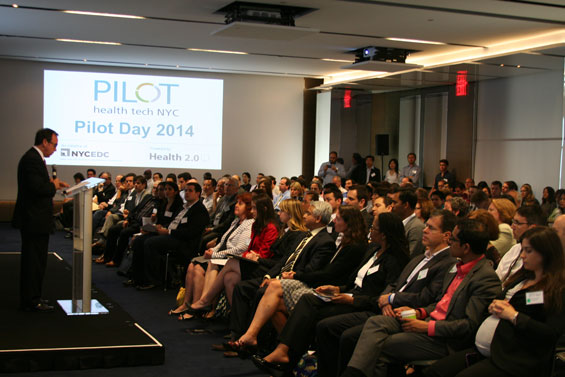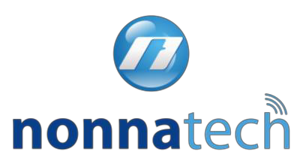Winners of Pilot Health Day 2014 and NYC Institutions Partner to Pilot Health Tech in the Big Apple

June marked Pilot Health Day 2014, a program that provides $1 million in funding to projects that pilot innovative health technologies in NYC. The day was sponsored by Health 2.0, an organization that showcases and catalyzes health technology, and the NYC Economic Development Corp.
Held at the Alexandria Center for Life Sciences, over 200 leaders in digital health, healthcare and venture convened to see live demos of this year’s winners. Eric Gertler, Executive VP of the NYCEDC and Managing Director for the Center for Economic Transformation, opened the event. The goals of the PILOT Health program were to increase healthcare quality, fill the need of startups to meet with potential partners and increase the number of jobs in the space. Josh Stein, a winner of Pilot Health Day 2013 and CEO of medical adherence startup Adheretech, spoke of the need for emerging digital health companies to meet with hospitals and payors, present their technologies and garner data that investors and future clients would find of interest. Potential partners benefit by being able to adopt and validate technologies in a four-to-nine month pilot study.
The process of Pilot Health and the culmination of its demo day in 2014 began months ahead. Interested parties attended information sessions as a first step. Then potential host institutions and startups filled out applications indicating interest. A matchmaking session was held between startups and institution hosts. Last, a joint proposal between matched pairs was presented before 18 distinguished judges who represent all sub sectors of healthcare and digital health. Health 2.0 CEO Indu Subaiya, explained that the proposals put forth had to address pressing healthcare needs and represent Health 2.0, meaning a healthcare system with technology that is adaptive, can integrate well and provide a strong user experience.
Benjamin Branham, Chief Strategy Officer at the NYCEDC, spoke about NYC’s role as a major digital health and life science hub. NYC is second only to Boston in NIH funding, and there are major initiatives under way to further strengthen the city’s position as a leader in science, healthcare and technology.
The 11 Winners of Pilot Health Day 2014:
1. Canopy Apps / Visiting Nurse Services of New York
VNS will use the Canopy medical translator app to improve communication with non-English speaking patients during home nursing and physical therapy visits. Other goals include improved patient/provider satisfaction with communication and improved workflow efficiency.
2. Hindsait / New York Blood Center
The New York Blood center will used Hindsait’s artificial intelligence, natural language processing, machine learning and predictive analytics software to score blood donor’s probability of donating blood. A communications platform will use tailored messaging to reach potential donors. Goal is to increase the number of African American donors, who are at higher risk for sickle cell disease.
3. Urgent Software, LLC / Mount Sinai Health System
Mount Sinai’s Cardiovascular Institute (CVI) will use Urgent Software to link local primary care physicians and their patients to cardiac specialists from CVI for referrals and follow-up care. Goal is to use the platform for better care coordination.
4. Nonnatech / Elderserve
Elderserve will use Nonnatech’s smart sensor technologies, which include monitoring medication adherence, toileting, fluid intake, sleep, and activities of daily living to prevent hospitalization. The goal is for early physiological detection and intervention to prevent hospitalization, increase staff resource allocation and efficiency and create cost savings.
5. Smart Vision Labs / SUNY College of Optometry
SUNY College of Optometry will use Smart Vision Labs’ smartphone attachment to test patients’ vision by measuring refraction and generate a prescription for eyeglasses. Goal is to test Smart Vision Labs’ technology versus that of standard machinery. Smart Vision Labs was also a winner of a $1 million Verizon Powerful Answers award for healthcare in 2014.
6. QoL Devices-Alv.io / Children’s Hospital at Montefiore Medical Center
Children’s Hospital at Montefiore will use Alv.io’s mobile and gamified respiratory training technology to engage, monitor and conduct performance analysis in the management of children suffering from asthma. The goal is to improve asthma care and reduce costs. Alv.io, nominated by NYC hardware accelerator R/GA, also won both Gold and Bronze awards at the Cannes Lions International Festival of Creativity 2014 (an honor shared only by 2 other companies from the United States, Google and Nike).
7. Fit4D / HealthFirst
Healthfirst will use Fit4D’s certified diabetes educators and algorithmic technology to help Spanish-speaking populations manage their diabetes. The goal is to reduce healthcare costs via education, monitoring and prevention of diabetes-related complications.
8. Tactonic Technologies / Rusk Rehab Center at NYU Langone
Rusk Rehab Center will use Tactonic’s sensor technology to objectively measure mobility and gait in elderly patients prior to discharge. The goal is to provide an objective measure of patient readiness for safe discharge in comparison to the current standard of subjective measures and prevent re-hospitalization.
9. AllazoHealth (/)/Accountable Care Coalition of Greater New York
Accountable Care Coalition of Greater New York will use Allazo’s predictive analytics technology to improve medical adherence in developmentally disabled populations by effectively anticipating the need for intervention and identifying the most cost-effective method. The goal is cost savings and evaluating impact of predictions and interventions.
10. Healthify / VillageCare
VillageCare’s case managers will use Healthify’s platform to connect patients with services that address social determinants of health inclusive of housing issues, food insecurity, etc and engage them with text messages. They will also be able to use the platform to review and rate community resources. The goal is address the social determinants of health via improved care coordination.
11. Gerijoy / Pace University
Pace University and Mount Sinai will evaluate the GeriJoy Companion, a virtual pet avatar that engages elderly patients while reporting data to remote caregivers, in pursuit of a reduction of hospital utilization for the Affordable Care Act’s top 3 preventable readmission risks: congestive heart failure, pneumonia and MI (heart attack). The goal is to reduce hospital resource utilization and re-admission. Gerijoy has been recognized by AARP, TEDMED, and the American Society of Aging as an innovative leader in senior care. Gerijoy is also a winner of a Verizon Foundation grant. Pace and Gerijoy were originally introduced at Pilot Health 2013 matchmaking day.
Pilot Health Day 2014 showcased innovative digital health companies working in partnership with NYC institutions to improve the quality and experience of healthcare. The trends among the pilot projects reflect aspects influenced by Affordable Care Act, but above all reflect areas of need within the healthcare ecosystem inclusive of better care coordination, cost control, improved efficiency, reductions in hospital admissions, improved medication adherence, addressing the social determinants of health and the needs of underserved populations, and the incorporation of sensor technology. They also are examples of technical solutions for large, real life, market -responsive problems and a collaboration between clinical innovators and technologists with applications to real world situations. Pilot Health, along with other sister initiatives from cross-industry innovators in the ecosystem, are proof that New York City is in the mix when it comes to creating and pioneering Health 2.0 and beyond.
